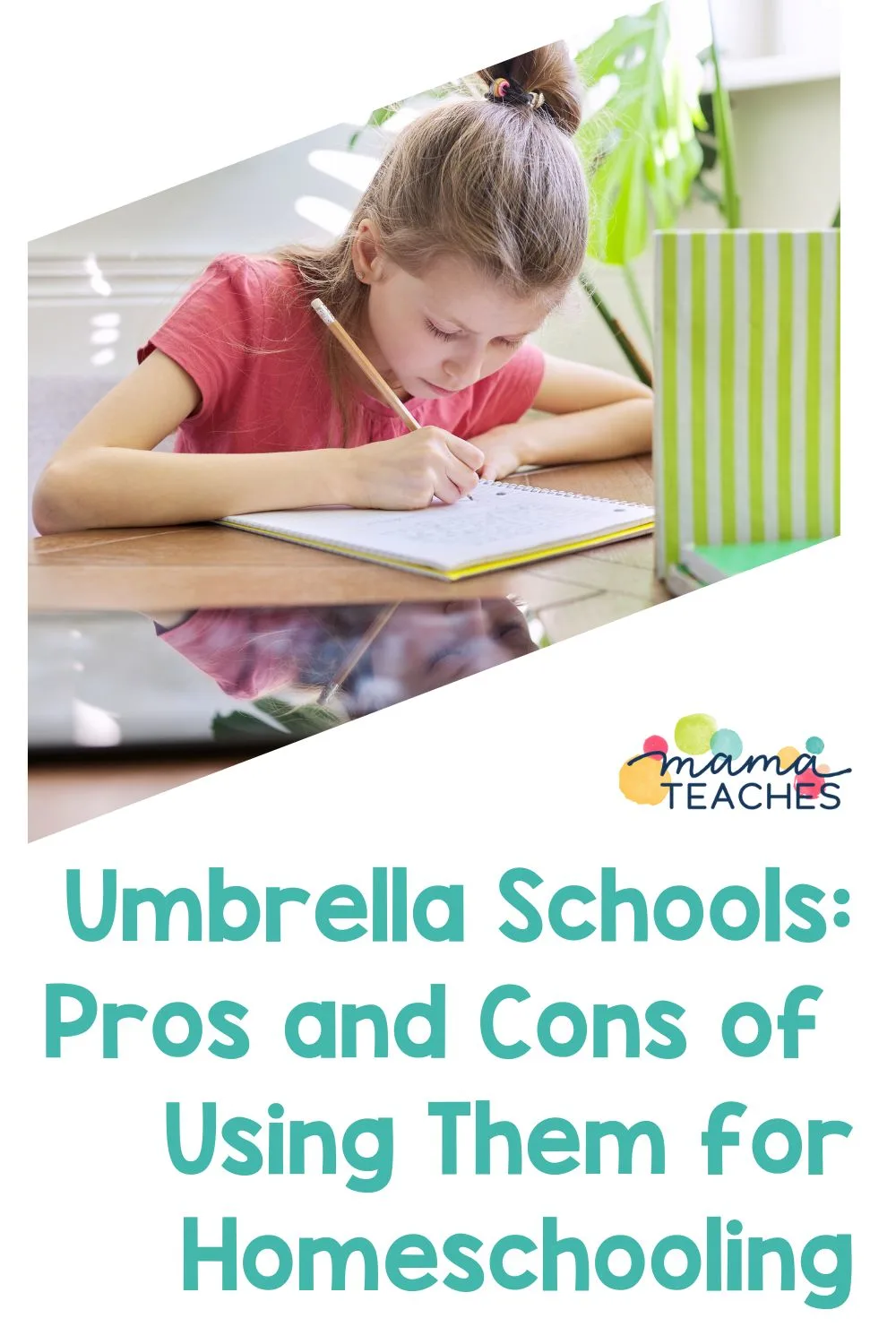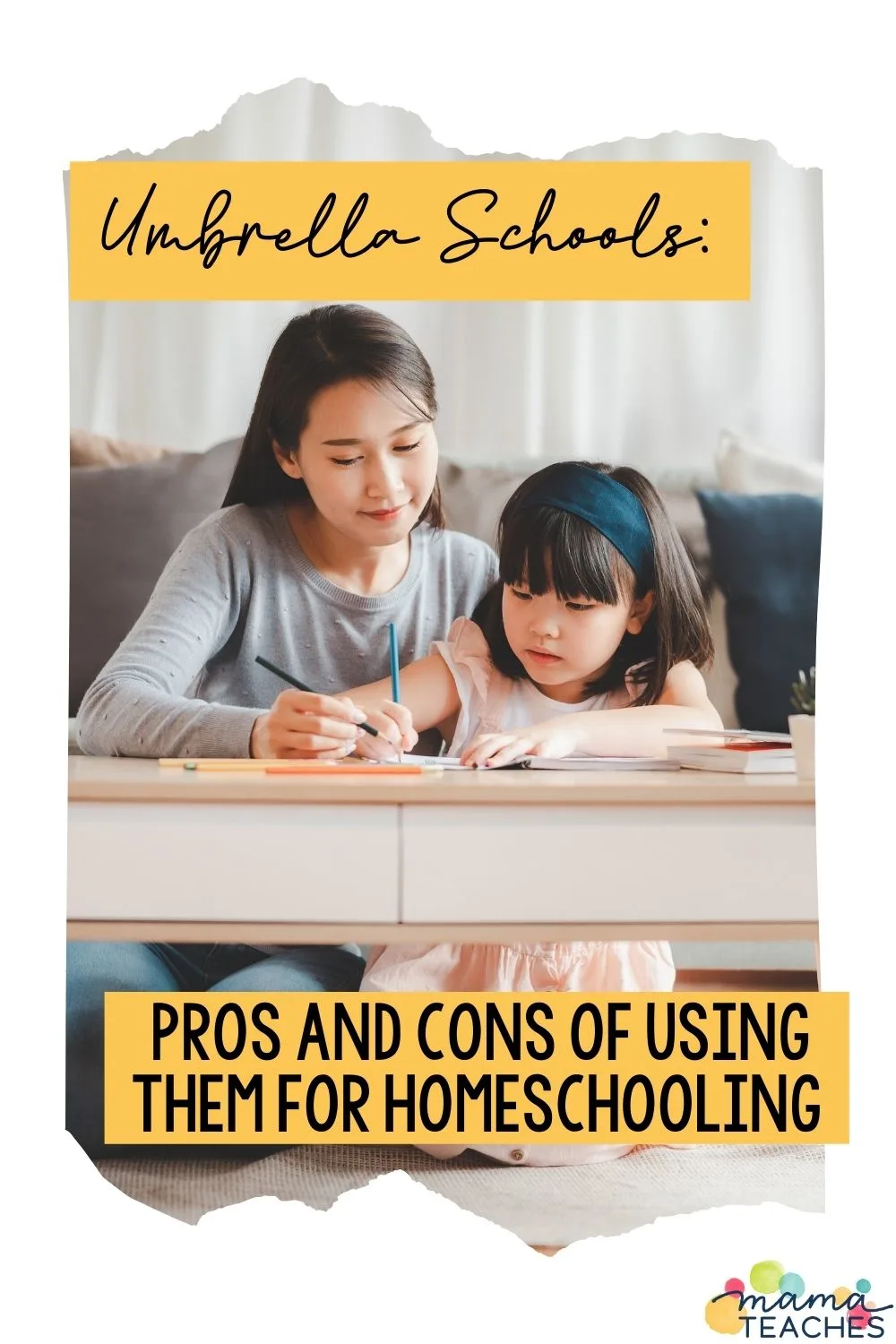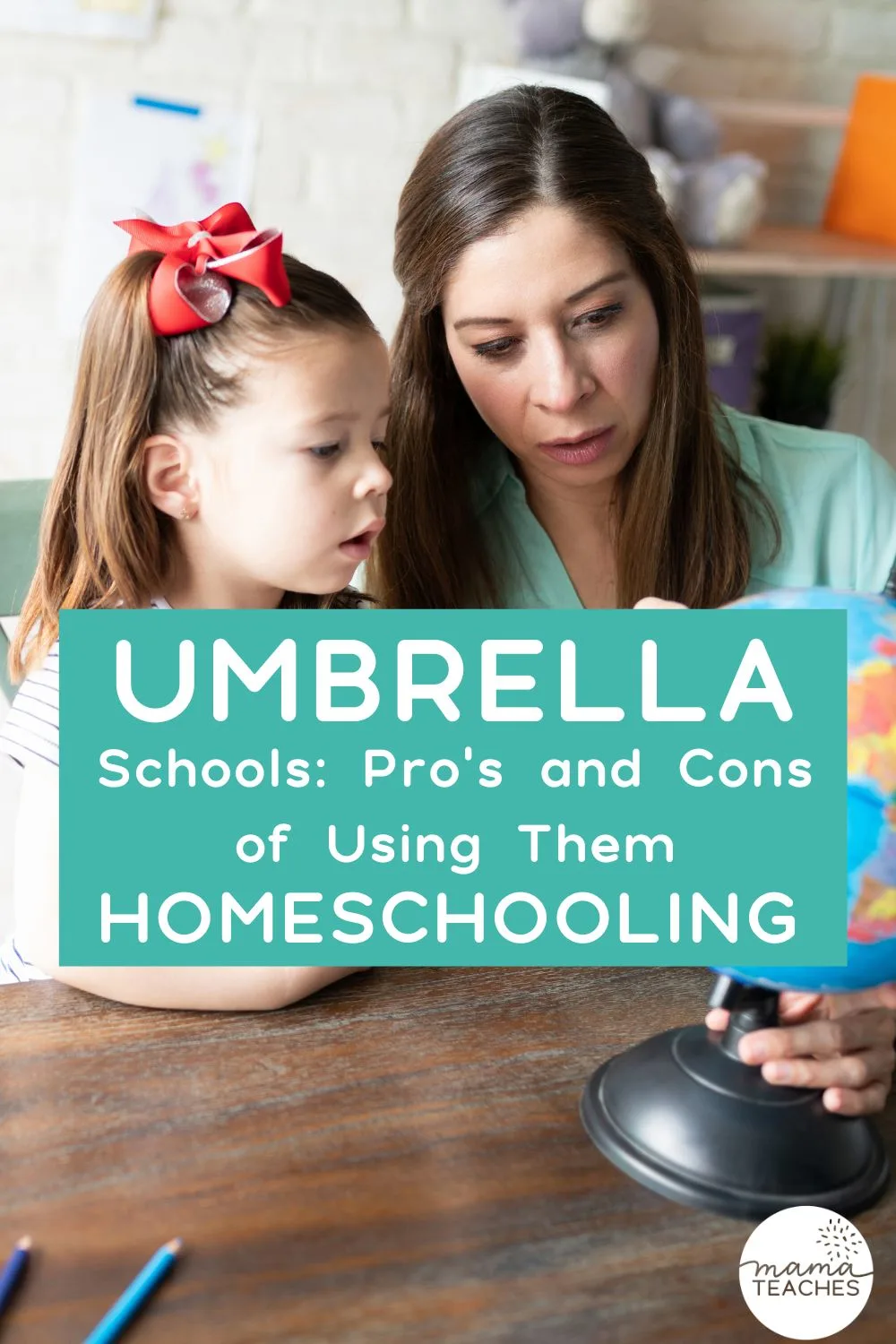Should you homeschool under an umbrella school? Before you decide, read the pros and cons of homeschool umbrella schools.

What Is an Umbrella School?
An umbrella school, or cover school, is an organization that provides support and oversight for homeschoolers.
Legally, it is classified as a private school.
Umbrella schools vary widely in their format and oversight.
An umbrella school may have a physical location near your home where your child attends classes on certain days of the week.
It could also be an online school where your child completes courses.
Another option is a correspondence-type umbrella school.
In this option, you, as the parent, choose the curricula, and the umbrella school provides the record keeping.
Let’s break down the pros and cons of each format.

This article contains affiliate links to things that you might like.
The Partial School
In this version of an umbrella school, your child takes classes at the school.
These classes are taught by teachers who design the curriculum and administer assessments (like tests and quizzes).
Typically, your child attends school 1-4 days per week.
On the off days, your child completes work at home under your supervision.
The Pros of the Partial School
You don’t need to choose the curricula, which can save you a lot of legwork.
The school also keeps records like attendance, report cards, and high school diplomas.
Your child has grades from people other than you, which some say makes the transcript more trustworthy.
This is also an excellent option for parents who work, as they often have kid-free hours (although some umbrella schools require parent attendance at school).
Students also have the opportunity to make friends with the other kids in their classes.
Partial schools often offer field trips, sports teams, and a full suite of extra-curricular activities for your child.
The Cons of the Partial School
A partial school may not fulfill the reason you decided to homeschool.
Does your family need flexibility? A partial school’s schedule is hard and fast.
Do you want to choose your child’s curricula and provide grades? None of that is up to you.
Does your child need to move at a different pace in certain subjects? You may not have that option.
A partial school is the most like a traditional school. It removes responsibility from you as the parent but also makes choices for you.
A partial school is often pricey (think private school prices), which can be a barrier.

The Online School
With an online umbrella school, your student takes classes online.
Your student does the work at home (or on the road, if that is where you go to school) but receives instruction and grades from the online courses.
The Pros of the Online School
Umbrella schools with an online option have soared in popularity.
They provide the flexibility of schooling from home (or anywhere in the world); they are the portable classroom.
All you need is a laptop!
Online teachers provide video or live lessons and administer assessments.
The umbrella school keeps track of attendance and provides grades, report cards, and diplomas.
An online school crafts a transcript of grades not assigned by the parent, giving some external validation.
The Cons of Online School
Not all students thrive in an online school setting. This is especially true for young learners and those with attention issues.
The online school selects the curricula, so you, as the parent, have little say in what your child learns or how he learns it.
Unless the online school provides live lessons, it is hard for students to ask questions when they don’t understand something.
You, as the parent, may not know how to help them when they ask because you are unfamiliar with the curriculum.
It can be challenging to make friends when you attend an online school.
You will likely have to supplement with other homeschooling groups or social activities.

The Correspondence School
Homeschool umbrella schools with this format are essentially private schools in name only.
You submit your records to them, but they may never see you or your child.
The Pros of the Correspondence School
Homeschool umbrella schools with a correspondence option offer you the most freedom.
Some may even let you choose your entire homeschool curriculum.
Others may provide options, while some will choose the curricula for you (and send you lesson plans).
With a correspondence school, your homeschool may look like your neighbors who homeschool through the state.
You are your child’s primary teacher, and you can adjust your lessons to move at your child’s pace.
The exception is that you submit attendance and grades to the school. They take care of the record-keeping (and legal compliance) for you!
The Cons of the Correspondence School
Umbrella schools with the correspondence format vary widely in the type of oversight they provide.
Some are entirely flexible, so they offer little support as a teacher.
Some are rigid, meaning you have plenty of support but little choice.
You need to choose the umbrella school that provides you with the right level of assistance.

Overall Pros and Cons to Umbrella Schools
Regardless of your choice of format, these are the overall pros and cons of umbrella schools.
Pro: Homeschool Legal Compliance
Umbrella schools can make homeschooling easier.
Depending on the regulations in your state, they may help with legal compliance.
Pro: Record Keeping
Homeschool umbrella schools maintain your child’s academic records, which lifts the burden off you. They may also administer standardized tests.
Pro: Guidance and Support
Depending on the umbrella school, they may provide curriculum support and guidance. This can be extremely helpful for a new homeschooler.
Pro: Socialization
If you choose a location near you (a partial school), your child will socialize with other kids and hopefully make friends.
Con: Cost
Most umbrella schools charge fees for their services. These fees can cost up to thousands of dollars.
Con: Loss of Freedom
No matter which umbrella school option you choose, you lose some degree of freedom as a homeschooler.
This loss of freedom can affect your curriculum choice and your family schedule.
Con: Inconsistent Quality
The quality of umbrella schools varies widely. They may not hire experienced or credentialed teachers. Their record-keeping may not be done well.
Con: Limited Options
Since regulations differ from state to state, you may have limited options for umbrella schools.
If you are looking for a partial school, one may not be in your area.
Con: Loss of Privileges
Some states confer certain rights and privileges to independent homeschoolers.
Homeschoolers may have access to state funds. They may be able to play sports, join clubs, or take a la carte classes at their local public school.
They may receive specific therapies free of cost.
Before registering with an umbrella school, contact your local homeschooling office to find out what you might be missing.

Choosing to Homeschool Through an Umbrella School
After weighing the pros and cons, you may decide to homeschool through an umbrella school.
The best place to start is to contact your state homeschooling association to find out about popular umbrella schools in your area.
You may also ask other homeschooling families about their umbrella schools; ask them for the pros and cons!
Whatever you decide, remember you make a decision on a year-by-year basis.
You can always switch between independent homeschooling and homeschooling through an umbrella school.
